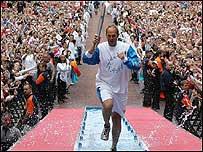Tales of Life After the Olympics

And so it’s over for another four years. We spectators are lucky: from the English Premier League to Wimbledon and the football World Cup, we have enough sport to entertain us all year round until 2012.
But what about the Olympic athletes once the spectacle finishes? Of course, the famous such as
Michael Phelpsand
Guo Jingjing
haven’t finished competing yet, and can live off their fame and endorsements of brands until the London Games. Yao Ming had a disappointing time in Beijing, but at least he can carry on playing basketball and earning money and glory with the Houston Rockets. The professional sportsmen and women who compete in the Olympics such as footballers or tennis players go back to their day jobs, earning millions.
Not all former Olympic athletes are so lucky. Some nations have started to reward successful Olympians with cash, but retired athletes still have to go on and find something else to do once the Games are over. What do they do to earn a living, or to satisfy their competitive nature?
So, imagine you’re a retired athlete. You’re super fit, you’re dedicated, you have self-discipline, a competitive streak, and you work well under pressure. It’s quite an impressive CV to take into the job market.
A billion people around the globe watch the Olympics, and athletes can land a job by simply having a recognizable face. Acting is one employment opportunity. Just ask 1976 decathlon gold medalist Bruce Jenner. After hanging up his shorts he got roles in the Village People film Can’t Stop the Music and as Officer Steve McLeish in the camp 1970s TV cop show, Chips.
It is depressing to see healthy athletes promoting the unhealthiest of food and drink, yet some former Olympians cash in on their fame in even more morally dubious and frankly bizarre ways. Swimmer Mark Spitz and gymnast Nadia Comaneci are currently using their wrinkle-free athletic faces to endorse the controversial beauty treatment botox.
One other equally dodgy career move for Olympians is to go into politics. Actors have done it, proving being photogenic and famous can get you into power, so why not athletes? British Olympic runner Sebastian Coe became a conservative MP in 1992, only to lose his seat in 1997. At least he looked good in a suit for a while.
Politicians certainly love successful sportspeople. But as British cyclist Chris Hoy has shown, Olympic gold medalists don’t always love being used by politicians, who try to steal some of their fame and glory. Over in Russia, Vladimir Putin clearly believes that athletic success means political gold. He has recruited a number of former Russian Olympians to work for his party, including Alexander ‘The Experiment’ Karelin, whose deadly wrestling skills could come in handy if there are ever hecklers in the Duma.
Sometimes, Olympic athletes simply can’t stop competing. British Decathlete Daley Thompson went on to play professional football with Mansfield Town. At the age of 40, he wasn’t finished with sport. Other former Olympians still addicted to competition include rower Steve Redgrave and runner Kelly Holmes, who both now battle in the tug of war and beat the keeper in the classic British TV sport series, Superstars.
And certain retired athletes can’t stop showing off. Running away with a circus was no pipe dream for former Olympic gymnast Elise Ray and synchronized swimmer Suzanah Bianco, who headed for Las Vegas and swapped medals for the Wheel of Death with the Cirque du Soliel.
Back to Reality
Those pesky psychiatrists invent syndromes and formulas for everything but happiness. It is no surprise they have analysed the post-Olympic blues that some athletes feel and concluded that an athlete needs to achieve fame or excellence after they retire from their sport.
But that could be nonsense. Cuban heavyweight boxer Felix Savon refused to turn professional after winning three gold medals and also turned down $10 million dollars to fight Mike Tyson. Savon epitomizes what the Olympics originally stood for, which was the glory of amateur sport, and is adored in Cuba for his integrity as much as his achievements. Rather than court fame or fortune, he paints canvases to “fight the nostalgia that hit me when I retired from boxing”
For lesser-known athletes, life after the podium isn’t lucrative. They spend their lives preparing for the Games, dedicating themselves to training and sacrificing time, money and energy, all fro a few weeks of glory.
And rather than try and cash in on their 15 minutes of fame, some do exactly what canoeing gold medalist Dr Tim Brabants did after Beijing, which is to go back to their normal jobs. There’s no hunger for fame or riches or endorsing dubious products for the likes of Dr Brabants, who has tasted glory and is now getting on with normal life. At least he has a great Olympic tale to tell to his patients.
Author: Tony Wildman
中文